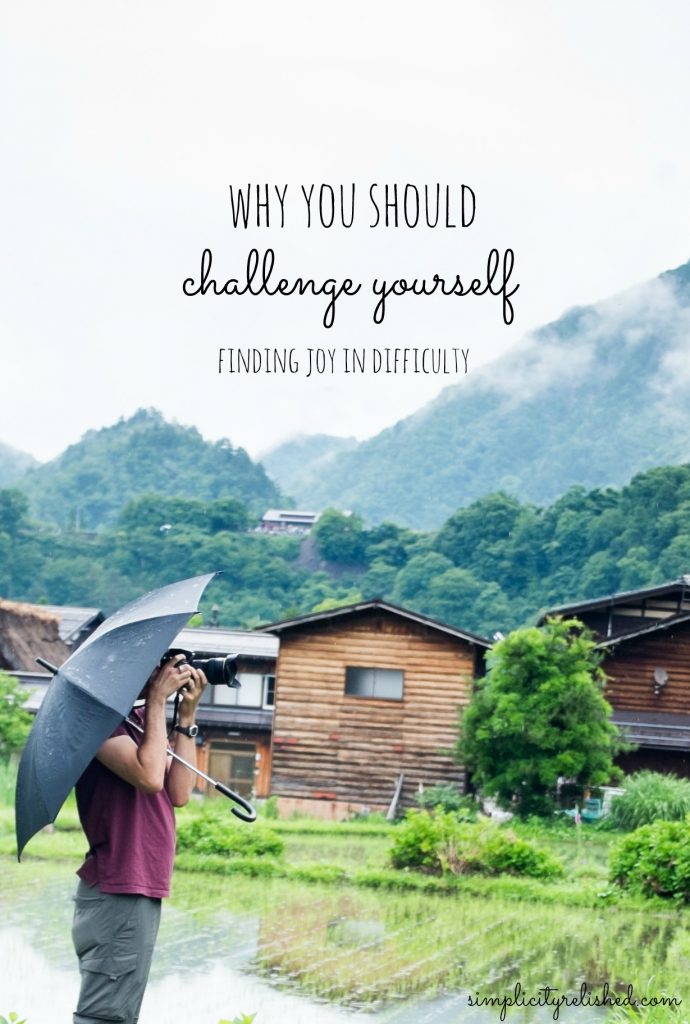Some believe that life should be easy. In fact, so many proponents of minimalism appear to advocate for simple living so that life can be easy. Or at least, easier.
And those writers do have a point: our constant consumption complicates our lives. Our acquisitions have to be cleaned and stored. Our assets have to be managed. And our income has to continue to keep up with the lifestyle we seek to project. Many of us live in the shadow of self-inflicted debt and under a pile of self-induced clutter. And we should stop that.
This well-placed anger toward clutter (and the habits that induce it) is often channeled into an aesthetic minimalism with simple-looking tabletops and blank pages, complete with latte art from hip coffee shops and hand-lettered prints, all encouraging others to pursue “what matters most.” I know, because I’ve been guilty of this presentation of simplicity, too.

But the truth is, life isn’t simple, and it shouldn’t be easy.
We wrestle with complex questions everyday:
Who am I?
Where do I fit in this world?
For what purpose am I here?
And while through seasons of busy-ness, we’d much prefer to keep these nagging questions in their respective boxes, there’s really no way to live meaningfully without answers– or at least the beginnings of answers.
Challenges run against our instincts
Don’t take this the wrong way: I’m not advocating for us to overfill our plates and overstuff our schedules just because it’s hard and we should do something that’s hard for us. A real challenge is more than something you just don’t have capacity for.
A real challenge– a meaningful challenge– takes you outside the near-mechanical functions with which you are so familiar. It breaks you out of patterns and habits you’ve relied on since you were a child.
And if you’re like me, a real challenge forces you to no longer rely on those old “tricks” that have always gotten you what you wanted. It forces you to be weak again. It forces you to be vulnerable.
You see, as adults, we’re trained to stick to what we’re good at. You no doubt found your way through high school surviving on your natural gifts (or practiced ones, if you were so lucky), because you’re told to focus on your strengths.
When we enter the workforce, we’re often told the same thing.
Play to your strengths.
Maximize your potential.
Contribute where your abilities are needed most.
[Tweet “Growing up, we’re told to focus on our strengths. But what if the treasure is in the challenge?”]
While I don’t disagree with this general ethos, I think many of us are too deeply steeped in this model of specialized efficacy. We think this is the right way for a business or organization to run, so it must also be the best way for our lives to be oriented. What this often leads to, though, is this: I’m not good at that, I’m good at THIS. So I’m going to stick to this. I can do this.
It’s also not true that sticking to what we’re “good at” means we will never be challenged. Quite the contrary; I like to think I am good at my job, and yet every day presents me with challenges that our team has to overcome together. It’s not easy. But I can feel myself thriving in that role.
On the other hand, there are activities (and jobs) I’ve tried to pick up that are anything but natural. After every attempt, I find myself in a state of stupor: Why am I doing this when I’m so bad at it? And it seems to come so naturally to that other person over there. I should just spend my time doing the things I’m good at. I should quit this hard thing.
What happens when you don’t quit
It’s one thing to experience setbacks, and then rally, hustle, and achieve success. It’s a whole different thing to continue to wrestle with discomfort and failure. No one can guarantee that years of trying inevitably yield accomplishment. Sometimes they don’t.
But here are a few questions to consider:
- What lessons might you learn in the hardship?
- What skills might you gain?
- Does this allow you to take a stand for something you believe in?
- How might this challenge broaden your ability to empathize with others who are struggling?
- Is there value in becoming someone who has tackled a formidable challenge– regardless of the outcome?
Obviously I think the answers are yes, but I believe in this so much that I counsel friends to pursue a challenging course even if success is not guaranteed.
Discovering challenges worthy of your vulnerability
So the question remains: what’s a challenge worth pursuing– more specifically, a challenge that puts you in a worthwhile place of vulnerability?
It has to start with a question of significance. This is less about mastering a skill, and more about entering into messy, difficult, and important work. Perhaps improving your skills will be part of the result, but the goal is to partake in something that matters to you, even if it’s hard.
Some people do this when they volunteer with an organization they love. They offer their time not because they’re already professionals, but because they believe someone has to, and they want to. Others endeavor to take on personal projects that they believe to be meaningful: generating content, art, or other products. Still others try something new for the good of their loved ones: they finally decide to pursue physical health, or they get involved with their kids’ activities despite not having any experience in those activities.
Ultimately, choosing to challenge yourself when you could easily sail through life is a challenge in itself. It has to be worth it. But in the challenge– that battle, the uphill climb– lies the priceless opportunity to grow. It means running up against our own failures, accepting them, trying again, and taking a stand.
[Tweet “Why you should challenge yourself– even when you’re already busy. via @daisysrosales”]


I loved this Daisy! This came at such a good time too, because I will really have to challenge myself in the next year or so. I need to finally gather the courage to go travel alone, which I’m terrified about, but I’m sure that once I push myself to do so, it will be so rewarding. I know that even if I decide I hate it and go home or go back to somewhere I’m comfortable with, it will not be failure because I at least tried. Thanks for this!
This is so well said! There’s something magical that happens when you feel like quitting and choose not to.
Beautifully written! I agree wholeheartedly–shying away from what challenges us might be the path of least resistance, but as a result it’s also the path of least growth.
This is really true. I think of things I’d like to do, but the fear of failure and going outside the box stop me a lot of the time. I will definitely be thinking about what you said in this post!
Thank you for this post, Daisy! I recently did not meet with success in a competition and thought to myself “Why did I even bother doing this when I KNOW I’m good at this other thing.” However, you’ve put into perspective that the outcome isn’t necessarily as beneficial as the challenge itself and that simplicity doesn’t have to equal easy.